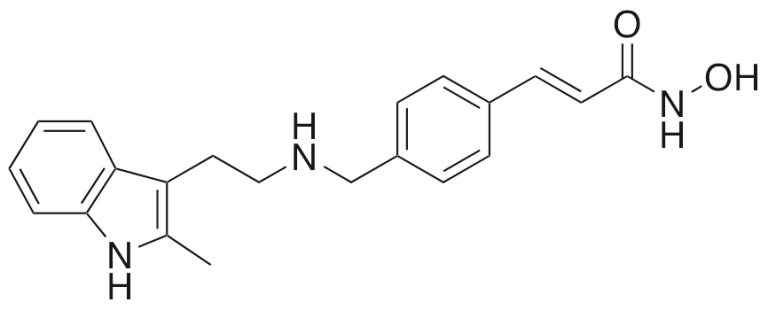服务热线
021-60498804
产品中心
/ Products Classification 点击展开+
| Cat. Number | L0528 |
| Chemical Name | L0528 LBH-589 404950-80-7 |
| CAS Number | 404950-80-7 |
| Mol. Formula | C21H23N3O2 |
| Mol. Weight | 349.43 |
| Qty 1 |
5mg |
| Qty 2 | 50mg |
| Appearance | Off white powder |
| Application Notes | ≥98% |
| Synonym | LBH589, Panobinostat |
| Solubility | DMSO 69 mg/mL (197.46 mM) Water Insoluble Ethanol Insoluble |
| Storage condition | -20°C |
| References | LBH-589 (Panobinostat) is a hydroxamic acid inhibitor of class I (1, 2, 3, and 11) histone deacetylases (HDACs) that is clinically used to treat multiple myeloma and is currently in clinical trials as a potential treatment for other cancers. This compound displays anticancer chemotherapeutic and anti-metastatic activities. LBH-589 reverses the epithelial-to-mesenchymal transition (EMT), inhibits cell proliferation, invasion, and migration, and decreases tumor growth in animal models of breast cancer. In hepatocellular carcinoma cells, LBH-589 inhibits oncogenic miRNA expression and upregulates expression of APAF1 and Beclin-1. ReferencesAndreu-Vieyra CV, Berenson JR. The potential of panobinostat as a treatment option in patients with relapsed and refractory multiple myeloma. Ther Adv Hematol. 2014 Dec;5(6):197-210. PMID: 25469210. Rhodes LV, Tate CR, Segar HC, et al. Suppression of triple-negative breast cancer metastasis by pan-DAC inhibitor panobinostat via inhibition of ZEB family of EMT master regulators. Breast Cancer Res Treat. 2014 Jun;145(3):593-604. PMID: 24810497. Henrici A, Montalbano R, Neureiter D, et al. The pan-deacetylase inhibitor panobinostat suppresses the expression of oncogenic miRNAs in hepatocellular carcinoma cell lines. Mol Carcinog. 2013 Dec 23. [Epub ahead of print]. PMID: 24375802. Ovejero-Sanchez M, Gonzalez-Sarmiento R, Herrero AB. Synergistic effect of chloriquine and panobinostat in ovarian cancer through induction of DNA damage and inhibition of DNA repair. Neoplasia. 2021 May;23(5):515-528. PMID: 339930758. Wilson A, Gupta V, Liu Q, et al. Panobinostat enhances olaparib efficacy by modifying expression of homologous recombination repair and immune transcripts in ovarian cancer. Neoplasia. 2022 Feb;24(2):63-75. PMID: 34933276. |





